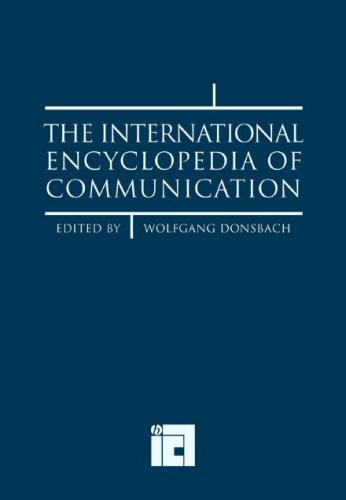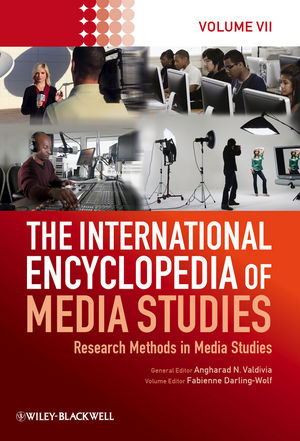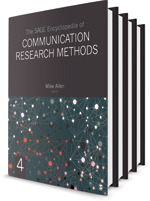Consult the following reference works to find definitions or background information:
For additional resources in French, consult the page Ouvrages de référence.
-
Communication, Cultural and Media Studies Now in its fifth edition, this book offers clear explanations of key concepts, showing where they came from, what they are used for, and why they provoke discussion or disagreement.
ISBN: 9781315225814 -
Cultural Theory : the Key Concepts Now in its second edition, this book is an up-to-date and comprehensive survey of over 350 of the key terms central to cultural theory today.
ISBN: 9780203933947 -
 Dictionary of Critical Theory
This is the most wide-ranging and up-to-date dictionary of critical theory available, covering the whole range of critical theory, including the Frankfurt school, cultural materialism, gender studies, literary theory, hermeneutics, historical materialism, and sociopolitical critical theory.
ISBN: 9780191726590
Dictionary of Critical Theory
This is the most wide-ranging and up-to-date dictionary of critical theory available, covering the whole range of critical theory, including the Frankfurt school, cultural materialism, gender studies, literary theory, hermeneutics, historical materialism, and sociopolitical critical theory.
ISBN: 9780191726590 -
Dictionary of Cultural and Critical Theory Now thoroughly updated and revised, this new edition provides an authoritative and accessible guide to modern ideas in the broad interdisciplinary fields of cultural and critical theory.
ISBN: 9781405168908 -
Dictionary of Film Studies Offering exhaustive and authoritative coverage, this book is written by experts in the field and covers terms, concepts, debates, and movements in film theory and criticism; national, international, and transnational cinemas; film history, movements, and genres; film industry organizations and practices; and key technical terms and concepts.
ISBN: 9780198832096 -
 Dictionary of Journalism
This book covers terminology relating to the practice, business, and technology of journalism, as well as its concepts and theories, organizations and institutions, publications, and key events. Related topic areas are covered where they impact on or offer explanations of journalism: for example, in law and sociology. There is also a chronology of developments in journalism.
ISBN: 9780191744365
Dictionary of Journalism
This book covers terminology relating to the practice, business, and technology of journalism, as well as its concepts and theories, organizations and institutions, publications, and key events. Related topic areas are covered where they impact on or offer explanations of journalism: for example, in law and sociology. There is also a chronology of developments in journalism.
ISBN: 9780191744365 -
Dictionary of Media and Communication This book offers points of connection between communication and media and covers all aspects of interpersonal, mass, and networked communication, including digital and mobile media, advertising, journalism, social media, and nonverbal communication.
ISBN: 9780198841838 -
Dictionary of Media and Communication Studies This new edition provides a detailed compendium of the different facets of personal, group, mass-media and internet communication that continues to be a vital source of information for all those interested in how communication affects our lives.
ISBN: 9781628921496 -
 Key Concepts in Media and Communications
This book covers the key concepts central to understanding recent developments in media and communications studies. Wide-ranging in scope and accessible in style it sets out a useful, clear map of the important theories, methods, and debates.
ISBN: 9781412928212
Key Concepts in Media and Communications
This book covers the key concepts central to understanding recent developments in media and communications studies. Wide-ranging in scope and accessible in style it sets out a useful, clear map of the important theories, methods, and debates.
ISBN: 9781412928212 -
The Media Studies Toolkit In this critical primer, the author introduces newcomers to the key concepts, issues, and vocabulary of media studies.The book examines topics from text and audience to citizenship and consumerism, drawing on a myriad of examples of media old and new.
ISBN: 9781003007708 -
 SAGE Dictionary of Cultural Studies
Containing over 200 entries on key concepts and theorists, this book provides a guide to the terrain of cultural studies.
ISBN: 9781446221280
SAGE Dictionary of Cultural Studies
Containing over 200 entries on key concepts and theorists, this book provides a guide to the terrain of cultural studies.
ISBN: 9781446221280
For additional resources in French, consult the page Ouvrages de référence.
-
 Encyclopedia of Communication Theory
The two volumes provide a one-stop source for a comprehensive overview of communication theory, offering current descriptions of theories as well as the background issues and concepts that comprise these theories.
ISBN: 9781412959384
Encyclopedia of Communication Theory
The two volumes provide a one-stop source for a comprehensive overview of communication theory, offering current descriptions of theories as well as the background issues and concepts that comprise these theories.
ISBN: 9781412959384 -
 Encyclopedia of Gender in Media
This book critically examines the role of the media in enabling, facilitating, or challenging the social construction of gender in our society. The work addresses a variety of entertainment and news content in print and electronic media and explores the social construction of masculinity as well as femininity.
ISBN: 9781452218540
Encyclopedia of Gender in Media
This book critically examines the role of the media in enabling, facilitating, or challenging the social construction of gender in our society. The work addresses a variety of entertainment and news content in print and electronic media and explores the social construction of masculinity as well as femininity.
ISBN: 9781452218540 -
 Encyclopedia of Media and Communication
This book synthesizes a wide array of works and perspectives on the making of meaning. The appendix includes timelines covering the historical record for each medium, from either antiquity or their inception to the present day.
ISBN: 1442611693
Encyclopedia of Media and Communication
This book synthesizes a wide array of works and perspectives on the making of meaning. The appendix includes timelines covering the historical record for each medium, from either antiquity or their inception to the present day.
ISBN: 1442611693 -
 Encyclopedia of Political Communication
This book discusses the major theoretical approaches to the field, including direct and limited effects theories, agenda-setting theories, sociological theories, framing and priming theories, and other past and present conceptualizations. It pays considerable attention to important political messages such as political speeches, televised political advertising, political posters and print advertising, televised political debates, and Internet sites.
ISBN: 1849725438
Encyclopedia of Political Communication
This book discusses the major theoretical approaches to the field, including direct and limited effects theories, agenda-setting theories, sociological theories, framing and priming theories, and other past and present conceptualizations. It pays considerable attention to important political messages such as political speeches, televised political advertising, political posters and print advertising, televised political debates, and Internet sites.
ISBN: 1849725438 -
 Encyclopedia of Public Relations
This two-volume book explores the evolution of the field with examples describing the events, changing practices, and key figures who developed and expanded the profession. Reader's Guide topics include Crisis Communications & Management, Cyberspace, Ethics, Global Public Relations, Groups, History, Jargon, Management, Media, News, Organizations, Relations, Reports, Research, and Theories & Models.
ISBN: 9781452276236
Encyclopedia of Public Relations
This two-volume book explores the evolution of the field with examples describing the events, changing practices, and key figures who developed and expanded the profession. Reader's Guide topics include Crisis Communications & Management, Cyberspace, Ethics, Global Public Relations, Groups, History, Jargon, Management, Media, News, Organizations, Relations, Reports, Research, and Theories & Models.
ISBN: 9781452276236 -
 Encyclopedia of Social Movement Media
The encyclopedia engages with all communication media: broadcasting, print, cinema, the Internet, popular song, street theatre, graffiti, and dance.
ISBN: 0761926887
Encyclopedia of Social Movement Media
The encyclopedia engages with all communication media: broadcasting, print, cinema, the Internet, popular song, street theatre, graffiti, and dance.
ISBN: 0761926887 -
 International Encyclopedia of Communication
This resource spans the breadth of communication studies, including coverage of theories, media and communication phenomena, research methods, problems, concepts, and geographical areas.
ISBN: 1405131993
International Encyclopedia of Communication
This resource spans the breadth of communication studies, including coverage of theories, media and communication phenomena, research methods, problems, concepts, and geographical areas.
ISBN: 1405131993 -
International Encyclopedia of Communication Research Methods This resource covers all communication research methods, from data collection to data analysis, from qualitative to quantitative, and from classical to modern approaches (such as psychophysiological measures, implicit association tests, and the analysis of big data). It introduces new and advanced methods and measurement tools that have been developed in other fields but which may be useful to communication scholars. This work features content from authors all over the world.
ISBN: 9781118901762 -
International Encyclopedia of Health Communication This resource presents a thorough overview of a dynamic field, bringing together entries by an international panel of contributors that address a comprehensive range of recent and emerging topics. With a global and interdisciplinary focus, this timely resource addresses cutting-edge digital technology, complementary and integrative healthcare, diversity and inclusion, health equity, COVID-19, and much more.
ISBN: 9781119678816 -
 International Encyclopedia of Intercultural Communication
This resource addresses issues, theories, and concepts that have substantively contributed to the development of intercultural communication theory and research. Five themes of intercultural communication: cross-cultural communication, cultural communication, intergroup communication, intercultural training, and critical intercultural communication, address issues of ethnicity and race in intercultural communication as an integral part of each thematic area.
ISBN: 9781118783665
International Encyclopedia of Intercultural Communication
This resource addresses issues, theories, and concepts that have substantively contributed to the development of intercultural communication theory and research. Five themes of intercultural communication: cross-cultural communication, cultural communication, intergroup communication, intercultural training, and critical intercultural communication, address issues of ethnicity and race in intercultural communication as an integral part of each thematic area.
ISBN: 9781118783665 -
 International Encyclopedia of Media Studies
This book probes the many dimensions of media studies: history, production, content, audiences, effects, and futures.
ISBN: 1405193565
International Encyclopedia of Media Studies
This book probes the many dimensions of media studies: history, production, content, audiences, effects, and futures.
ISBN: 1405193565 -
Oxford Research Encyclopedias: Communication This resource is developed for researchers, teachers, and students interested in all facets of the study of communication. Essays examine the evolution and structure of research programs; the questions and puzzles that drive research; and the relationships between theory, methods, and empirical data. In doing so, they provide information about their subjects and also highlight unresolved questions and potential new directions for research.
-
Routledge Encyclopedia of Citizen Media This book maps the multifaceted and vibrant site of citizen media research and practice, incorporating insights from across a wide range of scholarly areas. It explores the physical artefacts, digital content, performative interventions, practices and discursive expressions of affective sociality that ordinary citizens produce as they participate in public life to effect aesthetic or socio-political change.
ISBN: 9781315619811 -
 SAGE Encyclopedia of Communication Research Methods
The entries, authored by key figures in the field, focus on special considerations when applied specifically to communication research, accompanied by engaging examples from the literature of communication, journalism, and media studies. Entries cover every step of the research process, from the creative development of research topics and questions to literature reviews, selection of best methods (whether quantitative, qualitative, or mixed) for analyzing research results and publishing research findings, whether in traditional media or via new media outlets.
ISBN: 9781483381411
SAGE Encyclopedia of Communication Research Methods
The entries, authored by key figures in the field, focus on special considerations when applied specifically to communication research, accompanied by engaging examples from the literature of communication, journalism, and media studies. Entries cover every step of the research process, from the creative development of research topics and questions to literature reviews, selection of best methods (whether quantitative, qualitative, or mixed) for analyzing research results and publishing research findings, whether in traditional media or via new media outlets.
ISBN: 9781483381411 -
SAGE Encyclopedia of Intercultural Competence Cultural competence refers to the set of attitudes, practices, and policies that enables a person or agency to work well with people from differing cultural groups. Other related terms include cultural sensitivity, transcultural skills, diversity competence, and multicultural expertise. What defines a culture? What barriers might block successful communication between individuals or agencies of differing cultures? How can those barriers be understood and navigated to enhance intercultural communication and understanding? These questions and more are explained within the pages of this new reference work.
ISBN: 9781452244280 -
 SAGE Encyclopedia of Journalism
This book covers all significant dimensions of journalism, such as print, broadcast, and Internet journalism; U.S. and international perspectives; and history, technology, legal issues and court cases, ownership, and economics.
ISBN: 9781544391199
SAGE Encyclopedia of Journalism
This book covers all significant dimensions of journalism, such as print, broadcast, and Internet journalism; U.S. and international perspectives; and history, technology, legal issues and court cases, ownership, and economics.
ISBN: 9781544391199 -
SAGE International Encyclopedia of Mass Media and Society This book provides an overview of media within social and cultural contexts, exploring the development of the mediated communication industry, mediated communication regulations, and societal interactions and effects. It looks at issues such as free expression and government regulation of media; how people choose what media to watch, listen to, and read; and how the influence of those who control media organizations may be changing as new media empower previously unheard voices.
ISBN: 9781483375533
For additional resources in French, consult the page Ouvrages de référence.
-
Digital Roots: Historicizing Media and Communication Concepts of the Digital Age This book historicizes 16 concepts that have become central in the digital media literature, focusing on three main areas -- (1) Technologies and Connections, (2) Agency and Politics and (3) Users and Practices.
ISBN: 9783110740202 -
Film Studies: An Introduction This book covers the fundamental elements of formal film analysis, from the expressive content of individual images to the ways in which images link with one another; from the structures of narrative screenplays to the basics of cinematography, special effects, and sound.
ISBN: 9780231551564 -
Handbook of Communication History This book examines the history of communication history; the history of ideas of communication; the history of communication media; and the history of the field of communication.
ISBN: 9781136514302 -
Handbook of Global Health Communication This book offers a comprehensive and up-to-date analysis of the role of communication processes in global public health, development and social change.
ISBN: 9781118241868 -
Handbook of Global Media Research Research into the development of transnational media is an essential element of understanding the changes created by advanced globalization. This handbook explores and articulates the key themes and competing approaches of this dynamic and developing field.
ISBN: 9781405198707 -
 Handbook of Journalism Studies
This book is structured around theoretical and empirical approaches to journalism research and covers scholarship on news production, news content, journalism and society, journalism and culture, and journalism studies in a global context.
ISBN: 9781351683135
Handbook of Journalism Studies
This book is structured around theoretical and empirical approaches to journalism research and covers scholarship on news production, news content, journalism and society, journalism and culture, and journalism studies in a global context.
ISBN: 9781351683135 -
Handbook of Visual Communication This is a theoretical and methodological handbook for visual communication researchers and a compilation for much of the theoretical background necessary to understand visual communication.
ISBN: 9780429491115 -
 Hands on Media History
This book covers both analogue and digital media; film, television, video, gaming, photography and recorded sound. Understanding media means understanding the technologies involved. The hands on history approach can open our minds to new perceptions of how media technologies work and how we work with them. Essays in this collection explore the difficult questions of reconstruction and historical memory, and the issues of equipment degradation and loss.
ISBN: 9781351247412
Hands on Media History
This book covers both analogue and digital media; film, television, video, gaming, photography and recorded sound. Understanding media means understanding the technologies involved. The hands on history approach can open our minds to new perceptions of how media technologies work and how we work with them. Essays in this collection explore the difficult questions of reconstruction and historical memory, and the issues of equipment degradation and loss.
ISBN: 9781351247412 -
Mass Communication Theories: Principles and Application This book provides a comprehensive overview of mass communication theories, as well as their origins and empirical supports in psychology, sociology, political science, and philosophy. Each chapter presents a specific theory. It breaks each complex theory down into five or six interlinked basic propositions, making them easily digestible for students.
ISBN: 9781003083467 -
Oxford Handbook of Political Communication This book addresses the following five themes: contexts for viewing the field of political communication, political discourse, media and political communication, interpersonal and small group political communication, and the altered political communication landscape.
ISBN: 9780199793471 -
 Understanding Communication Theory
This book offers students a comprehensive, theoretical, and practical guide to communication theory. The author defines the various perspectives on communication theory—the social scientific, interpretive, and critical approaches—and then takes on the theories themselves, with topics including interpersonal communication, organizational communication, intercultural communication, persuasion, critical and rhetorical theory, and other key concepts.
ISBN: 9781315796710
Understanding Communication Theory
This book offers students a comprehensive, theoretical, and practical guide to communication theory. The author defines the various perspectives on communication theory—the social scientific, interpretive, and critical approaches—and then takes on the theories themselves, with topics including interpersonal communication, organizational communication, intercultural communication, persuasion, critical and rhetorical theory, and other key concepts.
ISBN: 9781315796710
For additional resources in French, consult the page Ouvrages de référence.
-
Canadian Film and Video : A Bibliography and Guide to the LiteratureCanadian and non-Canadian publications from the first decade of the twentieth century to 1989
-
History of Communication Research BibliographyReferences to 2,500+ articles, chapters, and books.
-
Oxford Bibliographies in Cinema and Media StudiesPeer-reviewed account of the most important resources pertaining to an array of subfields.
-
Oxford Bibliographies in CommunicationArticles providing guidance on epistemologies and methodologies of communication research.
Changer
This research guide by Téa Rokolj is licensed under CC BY-NC-SA 4.0